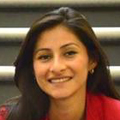Personal Mention
 Susan Finger, a professor of civil and environmental engineering who has always enjoyed working at the interface between culture and technology, has been named associate dean of the Integrative Design Arts & Technology (IDeATe) program. As a teenager she was an apprentice in a summer repertory theater, where she discovered her love for design and dance. Her passion has been reflected in her career in many ways, including working backstage in professional theater for five years. She received a bachelor's degree in astronomy from the University of Pennsylvania with a minor in medieval language and literature, a master's degree in operations research from Penn, and an interdisciplinary Ph.D. on photovoltaic power systems through civil engineering from MIT. She came to CMU in the late 1980s as research faculty in the Intelligent Systems Lab in the Robotics Institute and joined the faculty of the Civil Engineering Department in 1991. She has served two tours at the National Science Foundation; first, in the mid-1980s, as the first program director for the Design Theory and Methodology Program in the Engineering Directorate and, more recently, as a program officer for engineering education in the Division of Undergraduate Education. She is a fellow of the American Society of Mechanical Engineers. As associate dean of IDeATe, she said she is looking forward to working with faculty and students from across the university to cultivate a collaborative, creative and active learning environment.
Susan Finger, a professor of civil and environmental engineering who has always enjoyed working at the interface between culture and technology, has been named associate dean of the Integrative Design Arts & Technology (IDeATe) program. As a teenager she was an apprentice in a summer repertory theater, where she discovered her love for design and dance. Her passion has been reflected in her career in many ways, including working backstage in professional theater for five years. She received a bachelor's degree in astronomy from the University of Pennsylvania with a minor in medieval language and literature, a master's degree in operations research from Penn, and an interdisciplinary Ph.D. on photovoltaic power systems through civil engineering from MIT. She came to CMU in the late 1980s as research faculty in the Intelligent Systems Lab in the Robotics Institute and joined the faculty of the Civil Engineering Department in 1991. She has served two tours at the National Science Foundation; first, in the mid-1980s, as the first program director for the Design Theory and Methodology Program in the Engineering Directorate and, more recently, as a program officer for engineering education in the Division of Undergraduate Education. She is a fellow of the American Society of Mechanical Engineers. As associate dean of IDeATe, she said she is looking forward to working with faculty and students from across the university to cultivate a collaborative, creative and active learning environment.
 Alex Hills, Distinguished Service Professor in the Engineering and Public Policy and Electrical and Computer Engineering departments, is being inducted into the inaugural class of the Alaska Innovators Hall of Fame today (Oct. 7). Hills was elected in recognition of his work in creating rural Alaska’s telecommunications networks and his later contributions to developing Wi-Fi technology. He worked through the 1970s building radio stations and telephone systems to serve communities across the remote areas of Western and Northern Alaska. In the 1990s, he led the CMU team that built “Wireless Andrew,” the world’s first large Wi-Fi network and the prototype for many Wi-Fi networks that followed.
Alex Hills, Distinguished Service Professor in the Engineering and Public Policy and Electrical and Computer Engineering departments, is being inducted into the inaugural class of the Alaska Innovators Hall of Fame today (Oct. 7). Hills was elected in recognition of his work in creating rural Alaska’s telecommunications networks and his later contributions to developing Wi-Fi technology. He worked through the 1970s building radio stations and telephone systems to serve communities across the remote areas of Western and Northern Alaska. In the 1990s, he led the CMU team that built “Wireless Andrew,” the world’s first large Wi-Fi network and the prototype for many Wi-Fi networks that followed.
 Is there life after MOOCs? Phillip Compeau, who joined the Computational Biology Department this fall as an assistant teaching professor, argues in the October issue of the Communications of the ACM that often-derided massive open online courses need not go away, but should be transformed into more effective teaching products, called massive adaptive interactive texts or MAITs. He co-authored the Viewpoint commentary with Pavel Pevzner, professor of computer science and engineering at the University of California at San Diego. Read the commentary.
Is there life after MOOCs? Phillip Compeau, who joined the Computational Biology Department this fall as an assistant teaching professor, argues in the October issue of the Communications of the ACM that often-derided massive open online courses need not go away, but should be transformed into more effective teaching products, called massive adaptive interactive texts or MAITs. He co-authored the Viewpoint commentary with Pavel Pevzner, professor of computer science and engineering at the University of California at San Diego. Read the commentary.

 Mechanical Engineering professors Yoed Rabin (far left) and Michael Taylor (adjunct) have received a $150,000 award from the Department of Defense (DoD) to develop enabling technology for cryopreservation of blood vessels. This project focuses on synthetic ice modulators (SIMs), a cutting-edge technology to protect against the harmful effects of ice crystallization during cryopreservation.The project complements a broad program to advance SIMs-based cryopreservation, which was awarded a $1.6 million grant from the National Institutes of Health (NIH) earlier this month. Rabin directs the Biothermal Technology Laboratory and Taylor is a senior scientist at Tissue Testing Technologies LLC.
Mechanical Engineering professors Yoed Rabin (far left) and Michael Taylor (adjunct) have received a $150,000 award from the Department of Defense (DoD) to develop enabling technology for cryopreservation of blood vessels. This project focuses on synthetic ice modulators (SIMs), a cutting-edge technology to protect against the harmful effects of ice crystallization during cryopreservation.The project complements a broad program to advance SIMs-based cryopreservation, which was awarded a $1.6 million grant from the National Institutes of Health (NIH) earlier this month. Rabin directs the Biothermal Technology Laboratory and Taylor is a senior scientist at Tissue Testing Technologies LLC.
 CMU-Australia graduate Sara Hurtarte's case study on protecting young girls in Guatemala from sexual abuse was recently featured in The Australian. The 26-year old Guatemalan, who earned a master’s degree in public policy in Adelaide, is now aiming for a career in the social policy area in her native country to try to arrest an insidious and invisible crisis – the rape, abuse and early pregnancy of young girls, some as young as just 10. Mirna Montenegro, director of the non-government Sexual and Reproductive Health Observatory, was a key focus of Hurtarte’s case study, "Fighting the invisible crime: protecting girls in Guatemala," which was published by the Australian and New Zealand School of Government. Montenegro has led campaigns for stronger laws and better education within Guatemala, where illiteracy is a major problem. Pregnancy in girls under 14 is now a crime and authorities are using different communication tools, such as cartoons, to get messages about sexual violence through to young girls and provide pathways for those who are pregnant. “This strategy is about educating both authorities, parents and young girls. The material is mainly distributed at schools and community centres to help educate girls about sexual violence and also give them options if they’re pregnant,” Hurtarte said. Find out more.
CMU-Australia graduate Sara Hurtarte's case study on protecting young girls in Guatemala from sexual abuse was recently featured in The Australian. The 26-year old Guatemalan, who earned a master’s degree in public policy in Adelaide, is now aiming for a career in the social policy area in her native country to try to arrest an insidious and invisible crisis – the rape, abuse and early pregnancy of young girls, some as young as just 10. Mirna Montenegro, director of the non-government Sexual and Reproductive Health Observatory, was a key focus of Hurtarte’s case study, "Fighting the invisible crime: protecting girls in Guatemala," which was published by the Australian and New Zealand School of Government. Montenegro has led campaigns for stronger laws and better education within Guatemala, where illiteracy is a major problem. Pregnancy in girls under 14 is now a crime and authorities are using different communication tools, such as cartoons, to get messages about sexual violence through to young girls and provide pathways for those who are pregnant. “This strategy is about educating both authorities, parents and young girls. The material is mainly distributed at schools and community centres to help educate girls about sexual violence and also give them options if they’re pregnant,” Hurtarte said. Find out more.
